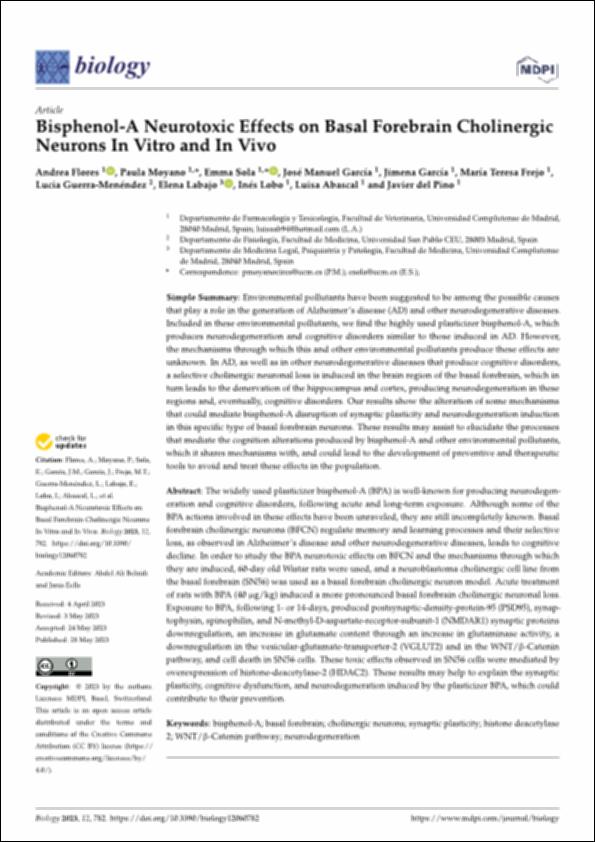Por favor, use este identificador para citar o enlazar este ítem:
http://hdl.handle.net/10637/14988Bisphenol-A Neurotoxic Effects on Basal Forebrain Cholinergic Neurons In Vitro and In Vivo

Ver/Abrir:
Bisphenol_Flores_et_al_Biology_2023.pdf
Acceso restringido
7,67 MB
Adobe PDF
Request a copy
| Título : | Bisphenol-A Neurotoxic Effects on Basal Forebrain Cholinergic Neurons In Vitro and In Vivo |
| Autor : | Flores, Andrea Moyano, Paula Sola, Emma García, José Manuel García, Jimena Frejo, María Teresa Guerra Menéndez, Lucía Labajo, Elena Lobo, Inés Abascal, Luisa Pino, Javier del |
| Materias: | Bisphenol-A; Basal forebrain; Cholinergic neurons; Synaptic plasticity; Histone deacetylase 2; WNT/ -Catenin pathway; Neurodegeneration |
| Editorial : | MDPI |
| Citación : | Flores, A.; Moyano, P.; Sola, E.; García, J.M.; García, J.; Frejo, M.T.; Guerra-Menéndez, L.; Labajo, E.; Lobo, I.; Abascal, L.; et al. Bisphenol-A Neurotoxic Effects on Basal Forebrain Cholinergic Neurons In Vitro and In Vivo. Biology 2023, 12, 782. https://doi.org/10.3390/ biology12060782 |
| Resumen : | The widely used plasticizer bisphenol-A (BPA) is well-known for producing neurodegeneration and cognitive disorders, following acute and long-term exposure. Although some of the BPA actions involved in these effects have been unraveled, they are still incompletely known. Basal forebrain cholinergic neurons (BFCN) regulate memory and learning processes and their selective loss, as observed in Alzheimer’s disease and other neurodegenerative diseases, leads to cognitive decline. In order to study the BPA neurotoxic effects on BFCN and the mechanisms through which they are induced, 60-day oldWistar rats were used, and a neuroblastoma cholinergic cell line from the basal forebrain (SN56) was used as a basal forebrain cholinergic neuron model. Acute treatment of rats with BPA (40 g/kg) induced a more pronounced basal forebrain cholinergic neuronal loss. Exposure to BPA, following 1- or 14-days, produced postsynaptic-density-protein-95 (PSD95), synaptophysin, spinophilin, and N-methyl-D-aspartate-receptor-subunit-1 (NMDAR1) synaptic proteins downregulation, an increase in glutamate content through an increase in glutaminase activity, a downregulation in the vesicular-glutamate-transporter-2 (VGLUT2) and in the WNT/ -Catenin pathway, and cell death in SN56 cells. These toxic effects observed in SN56 cells were mediated by overexpression of histone-deacetylase-2 (HDAC2). These results may help to explain the synaptic plasticity, cognitive dysfunction, and neurodegeneration induced by the plasticizer BPA, which could contribute to their prevention. |
| URI : | http://hdl.handle.net/10637/14988 |
| Derechos: | http://creativecommons.org/licenses/by-nc-nd/4.0/deed.es OpenAccess |
| ISSN : | 2079-7737 |
| Fecha de publicación : | 28-may-2023 |
| Centro : | Universidad San Pablo-CEU |
| Aparece en las colecciones: | Medicina |
Los ítems de DSpace están protegidos por copyright, con todos los derechos reservados, a menos que se indique lo contrario.

